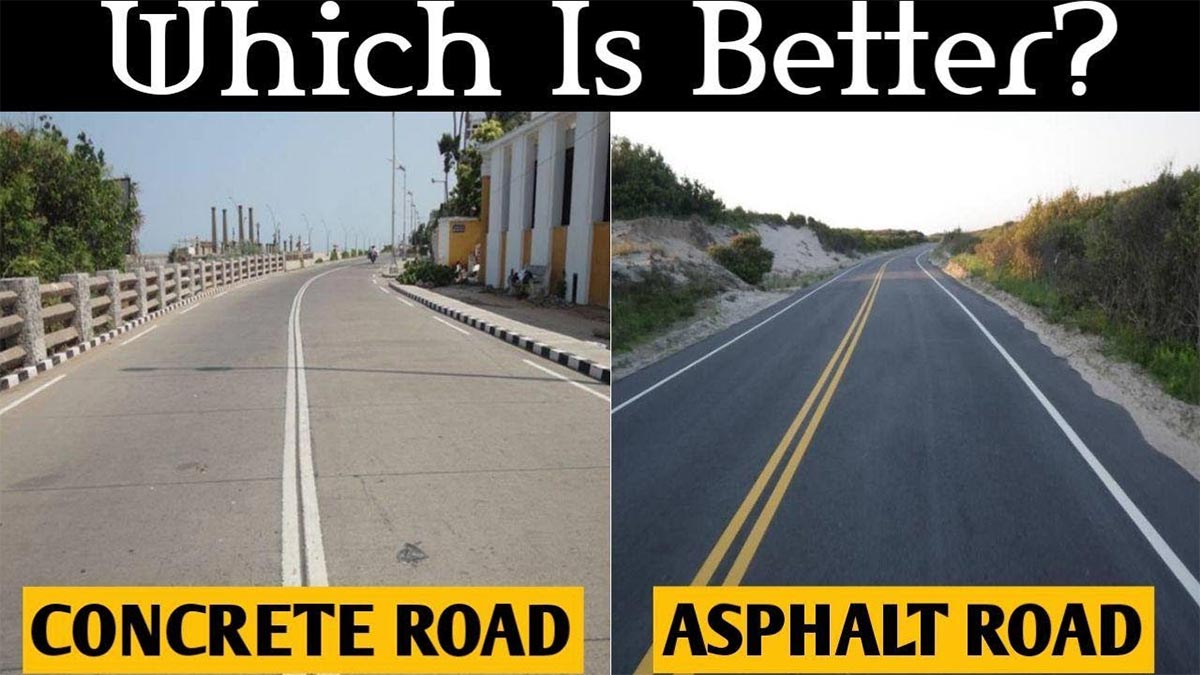There are thousands of square kilometers of paved surfaces across the US alone. When searching for a place to park your car or getting from your driveway to the street, you’ll use a paved surface. While there are several paving options, two of these options—asphalt and concrete stand out from the rest.
When planning to install a new driveway or you want to choose a paving material for your parking lot, both asphalt and concrete will be the primary paving options for the project. This, however, brings one question—which is better between the two?
In this post, we shall look at the differences between asphalt and concrete, and help you choose the better option. Read on for more information.
What is asphalt?
This is a mixture of aggregates, like sand, stones, and gravel, with bitumen as a binder. Bitumen is a dark sticky substance, which is a by-product of crude oil. Generally, asphalt is used for laying major roadways, airport runways, parking lots, and driveways. There are different types of asphalt. These include:
- Hot mix asphalt – this is made by heating the binder to reduce its viscosity.
- Warm mix asphalt – this form of asphalt uses emulations, waxes, or water to the binder, which makes it the best option for paving projects with a tight schedule.
- Cold mix asphalt – cold mix asphalt is made by emulsifying or blending the asphalt with water and soap. This reduces the viscosity of the asphalt before the aggregate is added. Mostly, cold mix asphalt is used for patching damaged areas or on roads with less traffic.
- Cut back asphalt – this is produced by dissolving the asphalt binder in kerosene or any other lighter petroleum material.
- Mastic or sheet asphalt – This is made by heating hard grade in a cooker until it liquifies, before adding the aggregates.
Advantages of asphalt
- Affordability – one of the main reasons why asphalt is very popular is its affordability. An asphalt paving project can cost you hundreds or thousands less than the same project if you use concrete.
- Aesthetics – the deep, black color of asphalt gives it a fresh, gleaming aesthetics appeal.
- Malleability – yes, asphalt is very flexible. And the good thing is, it doesn’t break. Asphalt expands and contracts with the weather, but retains its structural integrity.
- Maintenance – unlike concrete, asphalt is cheaper to repair, and repair works don’t require a lot of time and materials.
- Durability – although asphalt doesn’t last as long as concrete, it can last up to 30 years so long as it was installed properly and you schedule regular maintenance.
Disadvantages of asphalt
- Asphalt is susceptible to extreme temperatures – while the flexibility of asphalt allows it to handle different temperatures, it’s very vulnerable to extreme hot or cold temperatures. Extreme heat can make asphalt pit and cause other structural damage, while extreme cold makes asphalt paved surfaces crack and chip.
- Requires lots of maintenance – for asphalt to last longer, it needs a lot of maintenance, which can be a bit costly. Good asphalt maintenance practices include sealing small cracks before they turn into bigger issues and regularly sealcoating your asphalt.
What is concrete?
Concrete is a blend of aggregate materials like sand, gravel, water, chemical admixtures, crushed stone, slag, and recycled concrete, among other geosynthetic aggregates. Please note that each of these materials greatly determines the strength and quality of concrete. A concrete bonds together once liquid cement is added, and it requires several days to cure and becomes ready to be driven on. The most used type of concrete is Portland cement concrete, which is lime-based. Asphalt concrete, on the other hand, is a type of concrete primarily used for paving road surfaces.
According to the Florida asphalt paving experts from ABC Paving, concrete is very easy to work with when creating finishes. You can stain concrete to create different colors, as well as custom patterns. Besides, it can be stamped, etched, engraved, and sketched to provide a unique appearance. And, although concrete takes several days to cure, it’s very time-sensitive. Therefore, one needs to work fast with concrete after mixing the aggregates before the materials harden.
Advantages of concrete
- Strength – concrete is one of the strongest paving materials available. Concrete paved surfaces can handle extremely heavy loads, meaning you don’t have to worry about a garbage truck accessing your driveway regularly so long as you have a concrete driveway.
- Durability – when installed professionally, a concrete driveway can last up to 50 years. However, you must make sure that your concrete is well maintained to achieve the maximum lifetime.
- Aesthetics – as said earlier, concrete can be stamped, stained, rolled into patterns, or engraved to achieve different aesthetics. This is not possible with asphalt.
- Easy to maintain – unlike asphalt, concrete requires minimal maintenance. However, you should always fix any damage whenever it appears before it spreads and degrades your concrete.
Disadvantages of concrete
- It’s costly – concrete is one of the most expensive paving materials. However, the individual cost for any paving project will depend on the material choices as well as the region.
- Concrete tends to stain more than asphalt – gas and oil stains are more evident on concrete paved surfaces, and they can be very ugly if left uncleaned.
Costly to repair – yes, you should be ready to spend more on your concrete pavement repairs, even for minor repairs. Here is How Much Profit Do Builders Make? A Simple Calculation
